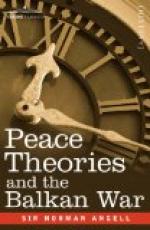The practical thing for us if we would avoid like errors in the future is to see where our responsibility lies—a thing which we shall never do if we are governed by the net impression which disengages itself from speeches like those of Mr. Churchill. For the net result of that speech, the impression, despite a few shrewd qualifications which do not in reality affect that net result but which may be useful later wherewith to silence critics, is that war is inevitable, a matter of “destiny,” that diplomacy—the policy pursued by the respective powers—can do nothing to prevent it; that as brute force is the one and final appeal the only practical policy is to have plenty of armaments and to show a great readiness to fight; that it is futile to worry about past errors; (especially as an examination of them would go a long way to discredit the policy just indicated); that the troublesome and unpopular people who in the past happen to have kept their heads during a prevailing dementia—and whose policy happens to have been as right as that of the popular side was wrong—can be dismissed with left-handed references to “complacency,” This sort of thing is popular enough, of course, but—
Well, I will take the risks of a tactic which is the exact contrary to that adopted by Mr. Churchill and would urge upon those whose patriotism is not of the order which is ready to see their country in the wrong and who do feel some responsibility for its national policy, to ask themselves these questions:
Is it true that the Powers could have prevented in large measure the abominations which Turkey has practised in the Balkans for the last half-century or so?
Has our own policy been a large factor in determining that of the Powers?
Has our own policy directly prevented in the past the triumph of the Christian populations which, despite that policy, has finally taken place?
Was our own policy at fault when we were led into a war to ensure the “integrity and independence of the Turkish dominions in Europe”?
Is the general conception of Statecraft on which that policy has been based—the “Balance of Power” which presupposes the necessary rivalry of nations and which in the past has led to oppose Russia as it is now leading to oppose Germany—sound, and has it been justified in history?
Did we give due weight to the considerations urged by the public men of the past who opposed such features of this policy as the Crimean War; was the immense popularity of that war any test of its wisdom; were the rancour, hatred and scorn poured upon those men just or deserved?
* * * * *
Now the first four of these questions have been answered by history and are answered by every one to-day in an emphatic affirmative. This is not the opinion of a Pacifist partisan. Even the Times is constrained to admit that “these futile conflicts might have ended years ago, if it had not been for the quarrels of the Western nations."[6] And as to the Crimean War, has not the greatest Conservative foreign minister of the nineteenth century admitted that “we backed the wrong horse”—and, what is far more to the point, have not events unmistakably demonstrated it?




